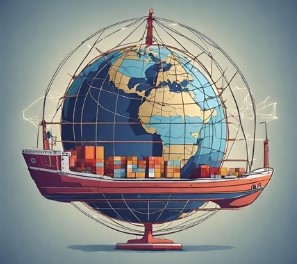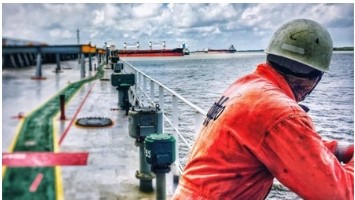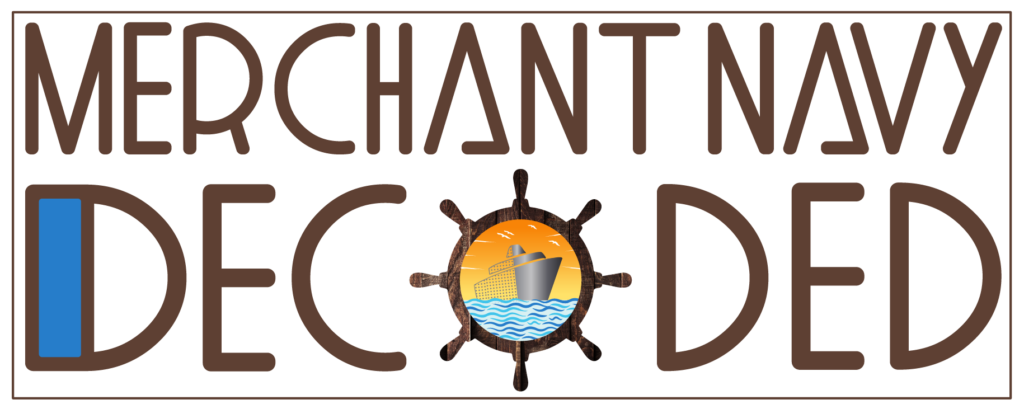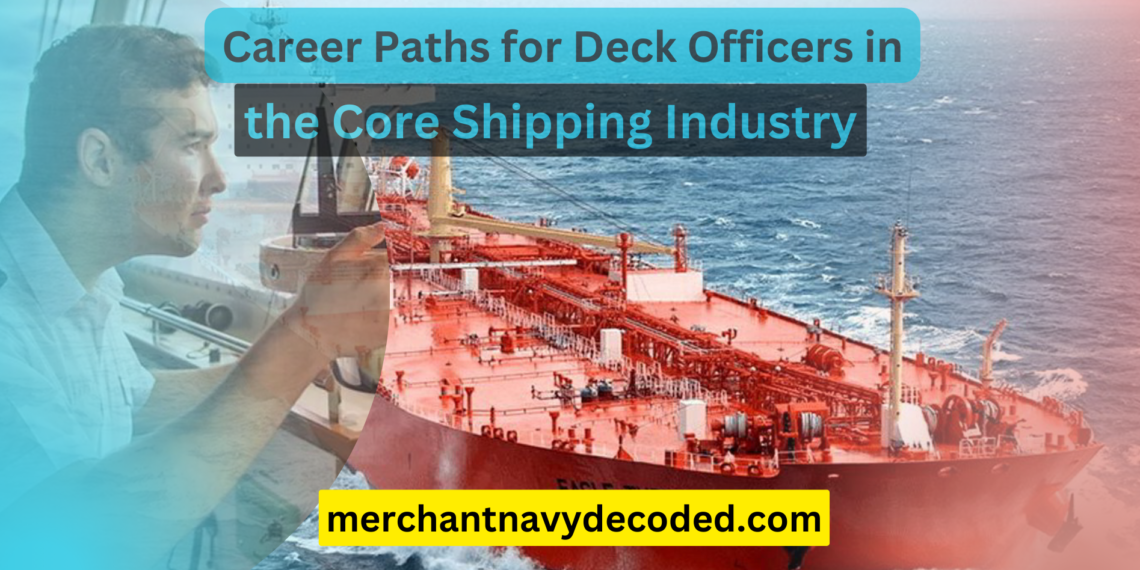Career Paths for Deck Officers in the Core Shipping Industry
Overview
- Decoding Deck Officer Roles: Explore the key responsibilities of operational and management level deck officers, uncovering their pivotal roles in ship operations.
- Navigating Career Progression: Understand the career journey from trainee to captain, discovering how experience and expertise lead to higher ranks in the maritime world.
- Building Maritime Careers: Discover how trainee deck officers kickstart their maritime careers, gaining the knowledge and experience needed to excel in their future roles aboard ships.
Core Shipping: Connecting Globe

The core shipping industry is like the heartbeat of the world’s trade and transport. It’s the engine that keeps goods moving across the oceans, connecting countries and people.
In simple terms, think of it as the massive puzzle of getting things from one place to another using huge ships. It’s not just about the ships themselves, but everything that makes them sail smoothly.
Imagine a big store with lots of products. The core shipping industry is what makes sure those products get from the manufacturer to the store’s shelves. This involves planning routes, loading and unloading cargo, making sure ships are safe, and following lots of rules to protect the environment and people.
It’s an industry full of adventure, responsibility, and opportunities, where people work together to keep the global supply chain running smoothly. Whether you’re out at sea, in a port, or in an office, the core shipping industry plays a vital role in connecting our world. So, it’s not just about ships; it’s about connecting people, places, and products across the seas.
Why Choose Core Shipping As a Career After Switching Onshore?

If you’ve ever felt the call of the sea, a career in core shipping might be your perfect next step. Here’s why it’s an exciting choice:
- Adventure Awaits: Working in core shipping is an adventure in itself. Every day is a new journey. You get to explore different ports, experience unique cultures, and face the challenges of the open sea.
- Thriving Industry: The shipping industry is a crucial part of the global economy. You’ll be contributing to the movement of goods worldwide. It’s a field with plenty of opportunities and room for growth.
- Lifelong Learning: Learning never stops in shipping. You’ll continuously expand your knowledge of navigation, safety, and technology. Plus, you’ll meet people from all walks of life, broadening your horizons.
- Environmental Awareness: The industry is also becoming more environmentally conscious. New technologies are being developed to make shipping greener. It’s an exciting time to be part of these positive changes.
If you’re still uncertain about making the switch to shore-based roles, I recommend revisiting our previous blog
“Navigating the Change | Sea to Shore”. It delves deeper into both the advantages and disadvantages of transitioning from a maritime career to an onshore position.
Understanding Deck Officer Roles: Trainee, Operational, and Management level

Trainee Level Deck Officer:
- Trainee deck officers are the rookies. They’re just starting and are learning the ropes. They work with the experienced officers to figure out how to navigate the ship, keep it safe, and deal with all the ship’s stuff. This training time is super important for them to learn what they need to move up in their deck officer jobs.
Operational Level Deck Officers:
- Operational deck officers handle the day-to-day work of ship navigation and safety. They’re like the crew’s problem-solvers, with ranks like Third Officer, Second Officer, and Chief Officer.
- The main jobs are steering the ship, making sure it’s safe and following the rules, managing the cargo, doing maintenance, and getting everyone ready for emergencies.
Management Level Deck Officers:
- Management deck officers are like the captains of the ship. They start as Chief Officers and can work up to become Captains (Masters). These folks are in charge of everything on the ship, from the crew to where the ship goes.
- They also deal with the people at the ports and make sure the ship follows all the rules. They’re all about keeping the ship running smoothly.
Opportunities for Management-Level Officers in the Core Shipping Industry

Operations Superintendent:
- Role: Operations superintendents oversee the operational aspects of a fleet of vessels. They ensure the safe and efficient execution of voyages, manage vessel schedules and handle crew matters.
- Responsibilities: Coordinating vessel movements, monitoring cargo operations, and addressing technical issues are central to their responsibilities. They also manage safety and compliance.
Marine Superintendent:
- Role: Marine superintendents are responsible for vessel maintenance and repairs. They ensure that vessels are in optimal condition by overseeing dry-docking, maintenance schedules, and equipment repairs.
- Responsibilities: Monitoring vessel condition, coordinating dry-docking, conducting surveys, and implementing safety measures are key aspects of their role.
Commercial Shipping (Brokering Salary and Scope):
- Role: Commercial shipping involves brokering charter contracts and managing vessel operations from a commercial perspective.
- Responsibilities: Brokers negotiate charter agreements, optimize routes, and ensure efficient cargo handling. While brokering salaries can vary, the scope for growth and advancement in commercial shipping is significant.
Post Fixtures – Voyage Manager:
- Role: Voyage managers focus on the post-fixture stage, ensuring that charter parties are executed smoothly. They handle issues related to cargo operations, documentation, and demurrage claims.
- Responsibilities: Coordinating cargo loading and unloading, managing laytime calculations, and resolving disputes are central to their responsibilities.
Voyage Optimization:
- Role: Voyage optimizers work on planning the most efficient routes and strategies to reduce fuel consumption and voyage costs.
- Responsibilities: Analysing weather conditions, optimizing routes, and managing fuel consumption for cost-effective and environmentally friendly voyages are key responsibilities.
Surveyor (Ship, Classification Society, Cargo):
- Role: Surveyors inspect and assess various aspects of shipping, including ships, cargo, and compliance with classification society standards.
- Responsibilities: Conducting surveys, preparing detailed reports, and ensuring compliance with safety, quality, and environmental regulations are primary responsibilities.
Port Captain and Owner Representative:
- Role: Port captains oversee vessel operations in ports and act as the owner’s representative. They ensure efficient cargo handling, port compliance, and safe vessel movements.
- Responsibilities: Coordinating port activities, managing cargo stowage, and ensuring compliance with port regulations are central to their role.
Vetting Surveyor and Pre-vetting Space (Freelance Work):
- Role: Vetting surveyors work on a freelance basis, conducting vessel inspections to assess their suitability for charter by oil and chemical companies.
- Responsibilities: Inspecting vessels for compliance with safety and quality standards, identifying deficiencies, and recommending improvements.
Crewing:
- Role: Crewing professionals handle the recruitment, placement, and management of seafarers on vessels. They ensure that ships are adequately staffed with competent crew members.
- Responsibilities: Conducting crew interviews, managing crew rotations, addressing crew welfare, and ensuring compliance with employment contracts are key responsibilities.
Maritime Training and Education:
- Role: Maritime educators and trainers work in both institutes and shipping companies to impart knowledge and skills to aspiring seafarers and existing crew.
- Responsibilities: Developing curriculum, conducting training sessions, and ensuring compliance with industry standards are core responsibilities.
Simulator Training:
- Role: Simulator trainers use advanced maritime simulators to train seafarers on various aspects of ship handling, navigation, and emergency response.
- Responsibilities: Designing and executing simulator-based training programs, assessing trainees’ performance, and enhancing their skills.
Research and Training:
- Role: Professionals in research and training roles contribute to maritime research, development, and the creation of training materials.
- Responsibilities: Conducting research, developing training content, and staying updated on industry advancements to enhance seafarers’ skills.
Business Development:
- Role: Business development professionals explore market trends, identify growth opportunities, and establish strategic partnerships to expand shipping companies’ services.
- Responsibilities: Market analysis, partnership development, and strategy formulation to grow business in the shipping industry.
Marine Technology (Building Applications and Modification):
- Role: Marine technology experts work on developing applications and technologies to enhance vessel operations and modify ship systems.
- Responsibilities: Designing, testing, and implementing technology solutions for improved ship performance and operational efficiency.
Opportunities for Operational Level Deck Officers

HSC (Safety and Quality Check):
- Role: Operational level deck officers can transition into roles focused on Health, Safety, and Environmental Compliance (HSC). They are responsible for ensuring that the vessel operates safely and complies with international maritime regulations and industry standards.
- Responsibilities: This role involves conducting safety inspections, overseeing safety drills and training, managing compliance with environmental regulations, and addressing safety concerns.
- Skills Needed: Attention to detail, knowledge of safety regulations, and the ability to implement and maintain safety protocols are essential.
Business Development:
- Role: Deck officers can enter the business development domain within the shipping industry. They work on identifying growth opportunities, expanding business networks, and fostering relationships with clients, partners, and stakeholders.
- Responsibilities: These professionals analyse market trends, develop business strategies, negotiate contracts, and explore potential markets for the shipping company’s services.
- Skills Needed: Strong communication, negotiation skills, and a deep understanding of the shipping industry’s needs and dynamics are crucial.
Commercial Shipping:
- Role: Many operational level deck officers progress into commercial shipping roles. This involves chartering vessels, brokering shipping contracts, and managing vessel operations from a commercial perspective.
- Responsibilities: Deck officers may handle negotiations, manage charter agreements, optimise routes, and ensure efficient cargo handling and vessel maintenance.
- Skills Needed: A combination of maritime knowledge, negotiation skills, and an understanding of market dynamics is essential for success in commercial shipping.
Purchase Department:
- Role: Deck officers can transition into the purchase department where they manage the procurement of supplies, equipment, and spare parts for vessels.
- Responsibilities: They are responsible for sourcing cost-effective materials, ensuring timely delivery, maintaining inventory, and negotiating contracts with suppliers.
- Skills Needed: Strong procurement and negotiation skills, knowledge of vessel requirements, and the ability to manage supply chains are vital.
Routing (Assist in Coordination of Operational Level Deck Officers):
- Role: Operational level deck officers can assist in routing and navigation coordination. They work with the deck team and navigational officers to ensure safe and efficient voyages.
- Responsibilities: This includes monitoring weather conditions, optimizing routes to minimise fuel consumption and reduce travel time, and assisting in bridge operations.
- Skills Needed: Navigational expertise, understanding of voyage planning, and the ability to work effectively in a team.
Assistant Surveyor (Basic Cargo and Bunker Level):
- Role: Deck officers can transition to roles as assistant surveyors, focusing on cargo and bunker inspections. They inspect cargo condition, quantities, and quality, as well as bunker fuel handling.
- Responsibilities: Conducting cargo and bunker surveys, preparing reports, and ensuring compliance with regulations and industry standards.
- Skills Needed: Attention to detail, knowledge of cargo handling, and understanding of bunker fuel operations are key.
Business Analyst (Understanding Requirements and Developing Paths):
- Role: Deck officers can work as business analysts within shipping companies. They bridge the gap between operational needs and technical solutions, helping to streamline processes and optimise operations.
- Responsibilities: They gather requirements from various departments, analyze data, and develop strategies for improving efficiency, cost-effectiveness, and overall performance.
- Skills Needed: Analytical thinking, communication skills, and a strong understanding of shipping operations are important.
Conclusion

A career in core shipping after making the switch from onshore promises a daily dose of adventure and challenge. Each day brings new horizons to explore and conquer, with opportunities for upskilling and learning never in short supply.
While it’s true that the shore-based salary might not match the expectations set by your time at sea, the good news is that the progression graph is on a fast upward climb. With dedication and commitment, you can quickly ascend the career ladder, enjoying both personal and financial growth. So, embrace the sea in your heart, and set sail on a promising journey in the world of core shipping.
Disclaimer :- The opinions expressed in this article belong solely to the author and may not necessarily reflect those of Merchant Navy Decoded. We cannot guarantee the accuracy of the information provided and disclaim any responsibility for it. Data and visuals used are sourced from publicly available information and may not be authenticated by any regulatory body. Reviews and comments appearing on our blogs represent the opinions of individuals and do not necessarily reflect the views of Merchant Navy Decoded. We are not responsible for any loss or damage resulting from reliance on these reviews or comments.
Reproduction, copying, sharing, or use of the article or images in any form is strictly prohibited without prior permission from both the author and Merchant Navy Decoded.


